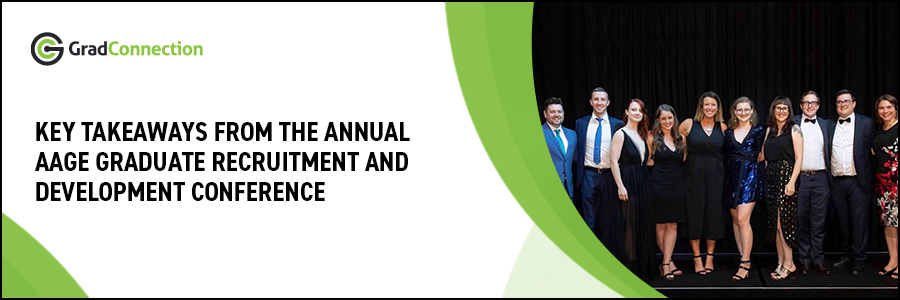
The Annual AAGE Graduate Recruitment and Development Conference was larger than it has ever been this year, what a great reflection of the graduate recruitment industry’s growth.
We were delighted to see you all again and humbled that you voted us in as the “Best Supplier” again this year. We truly thank you for your ongoing support.
Thought leadership was very much alive with topics ranging from AI to wellness in the workplace. Three key trends that came up in most talks were around:
- Candidate sourcing - how early is too early to start raising awareness of your brand? First year of uni? Highschool? Kindergarten?
- Innovative uses of technology that truly help support your recruitment strategy
- Authenticity and value match: Understanding what Gen Z want
Despite technological advancement in the recruitment industry, the traditional recruitment model has never really changed - the process has always been: attract > recruit > hire > train. Now, leading companies globally are tipping the recruitment model on its head by finding ways to invest in the development of students long before the application process.
There is a shift to early talent strategy ‘positively impacting’ potential candidates earlier in the pipeline using pre-training and development initiatives. InsideSherpa shared some interesting ideas in their presentation on “How investing in the development of students is helping companies attract early talent.”
According to InsideSherpa the main benefits for employers offering pre-training programs to students include a greater alignment of skills and interests to roles, increased work-readiness alongside an increase in candidate diversity.
Pre-training is also beneficial for companies as there is goodwill associated with it and it is seen to increase the companies social impact.
Some examples of these programs include:
- Facebook run an 8 week high school program focusing on under-represented communities
- BP run a 1 week long in-office experiences for early year students to gain exposure to a company’s work culture and people
- L’oreal run a global case competition in which students design a new product which helps them recruit 150-200 grads each year
Allowing students to experience company culture early on has shown to have an increase in retention and employer happiness. In their talk “Strengths-based Recruitment”, Cappfinity highlighted how easy it is to screen applicants that will be a great role and cultural fit. “The idea is to find candidates that don’t just know how to do the role, but who will love doing it” said Lucy Zucker from Cappfinity. And the best part is that you don’t need any advanced technology for this. It is a simple interviewing technique you can implement into your recruitment strategy tomorrow.
“Don’t focus on what they say it but concentrate on how they say it” said Lucy. When people are passionate about a topic they rarely need probing questions - in fact you can do this exercise with a colleague or friend and see for yourself. Firstly ask them about something that they hate and let them talk for 2 minutes. You might find that they will have trouble speaking for the entire 2 minutes. Then ask to tell you about something that they love. Usually, you will see a difference in body language and the flow of conversation, they will have much more to say about the subject. Look out for these traits when you ask the candidate questions about the role.
If technology and innovation is a part of your recruitment strategy you might take the assessments to the next level and immerse candidates into your company culture virtually. Accenture, for example, has created a specially crafted candidate portal that fully immerses candidates into their work environment. This has allowed them to see how a person might respond to a tricky situation first hand. Instead of asking “how would you respond in this situation” they can simulate it virtually and watch how they manage it. An example of this might take place in a virtual conference call with difficult stakeholders where the candidate is tasked to lead the call and make sure to resolve all stakeholders’ issues.
Allowing the candidate to see what working at a company might look like plays an important role for the candidate too. According to our research Gen Z and Millenials look for authenticity and true value match to employers. That means employer transparency is key for retaining your grads.
By 2025 75% of the global workforce will be made of Gen Z and Millenials and future-proofing your recruitment strategy means being able to deliver on the expectations of this demographic. For more stats and tactics on how to cater to them grab a copy of our AAGE presentation “Attraction and the Future of Work” by emailing us at [email protected].
We are also offering a limited number of strategy session in which we help you set up your 2020 grad recruitment strategy for success with the backing of internal stats by our award winning team. To book your spot get in touch with [email protected].
